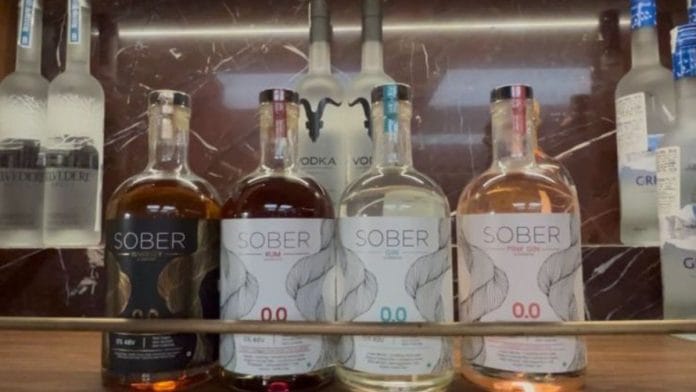New Delhi: It’s Tuesday evening, and while Ruchika Mehta typically avoids alcohol on weekdays, she couldn’t turn down a date’s invitation. Her date explored a menu of cocktails at a GK bar, Mehta couldn’t just sip plain water. Instead, she opted for a ‘Sober Picante’, a cocktail-inspired drink minus the tipsiness.
“Meeting up for drinks isn’t just about alcohol anymore. But, you also can’t really hang out over mocktails or fruit juices at a bar,” Mehta, a 25-year-old HR intern, told ThePrint. “But zero-proof drinks have emerged as a sweet spot.”
These zero-proof cocktails are fueling the rise of the ‘sober curious’ movement, a trend largely driven by Gen Z—‘not-drinking’ is the new cool. Statistics from around the globe suggest that Gen Z is drinking less alcohol as compared to millennials. The share of young people born between 1997 and 2002 who say they plan to drink less alcohol in 2024 jumped 53 per cent year over year, a NCSolutions report stated.
An IWSR report reveals that temporary abstinence is gaining traction in India, particularly among younger LDA+ (legal drinking age) consumers. “In 10 major Indian cities, 72 per cent of affluent drinkers reported taking a break from alcohol for a period,” the report noted. This is not it. According to Statista, Gen Z is spending far less on alcoholic beverages compared to previous generations.
However, this doesn’t mean Gen Z is cutting ties with alcohol altogether, instead, they are redefining their relationship with it. With health and wellness now top priorities, this generation is opting for moderation over excess. India’s nightlife still echoes with the sound of cocktail shakers, only now, the buzz comes without the alcohol. And, a bunch of brands like Sober, Catwalk Botanics and Sobriety Sips are cashing it out.
“A fancy drink fits the bill (alcoholic or not). In the end, consumers want to enjoy the experience, the complex flavours, pleasing to the eye and not feel left out in a social setting,” said Vansh Pahuja, founder of non-alcoholic drink brand Sober.
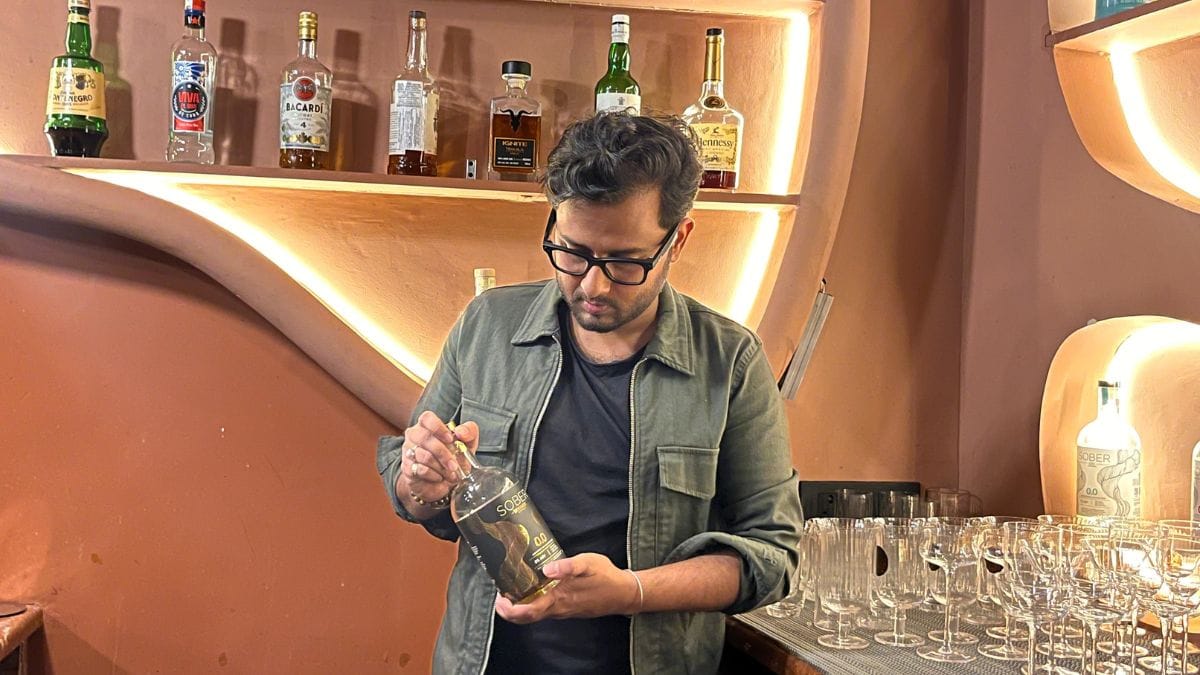
Potential of zero-proof cocktails
For 33-year-old Vikram Bisht, citrusy spritzers and blueberry lemonades were once his go-to orders. But over time, the overly sweet mocktails lost their appeal, especially as his law-firm colleagues flaunted their fancy-looking cocktails.
Today, zero-proof cocktails offer him a stylish alternative. Unlike traditional mocktails loaded with sugary syrups and soda, these drinks are crafted to replicate the complexity and flavour profile of alcoholic cocktails. For instance, the tequila-based spicy Picante is all the rage in Delhi NCR. But, many bars and restaurants serve non-alcoholic Picante with the same spicy coriander-ish flavour.
These non-alcoholic craft cocktails also involve raw ingredients and mixology techniques like clarifications and fat washes that elevate the drinking experience. Many use non-alcoholic spirits, bitters, infusions, and garnishes that replicate the traditional cocktails.
However, this level of craftsmanship comes at a cost. The standard window of pricing zero-proof cocktails is between Rs 400-Rs 595. Hence, Bisht isn’t sure if zero-proof cocktails can become a part of his lifestyle.
“It’s double the price of a mocktail,” Bisht pointed out at the menu of Bo Tai, a Thai restaurant near Qutub Minar, where non-alcoholic drinks were labelled as “Temperance cocktails” and were priced at Rs 545. Similarly, at Iki & Gai in RK Puram, the sober drink menu retails at Rs 595.
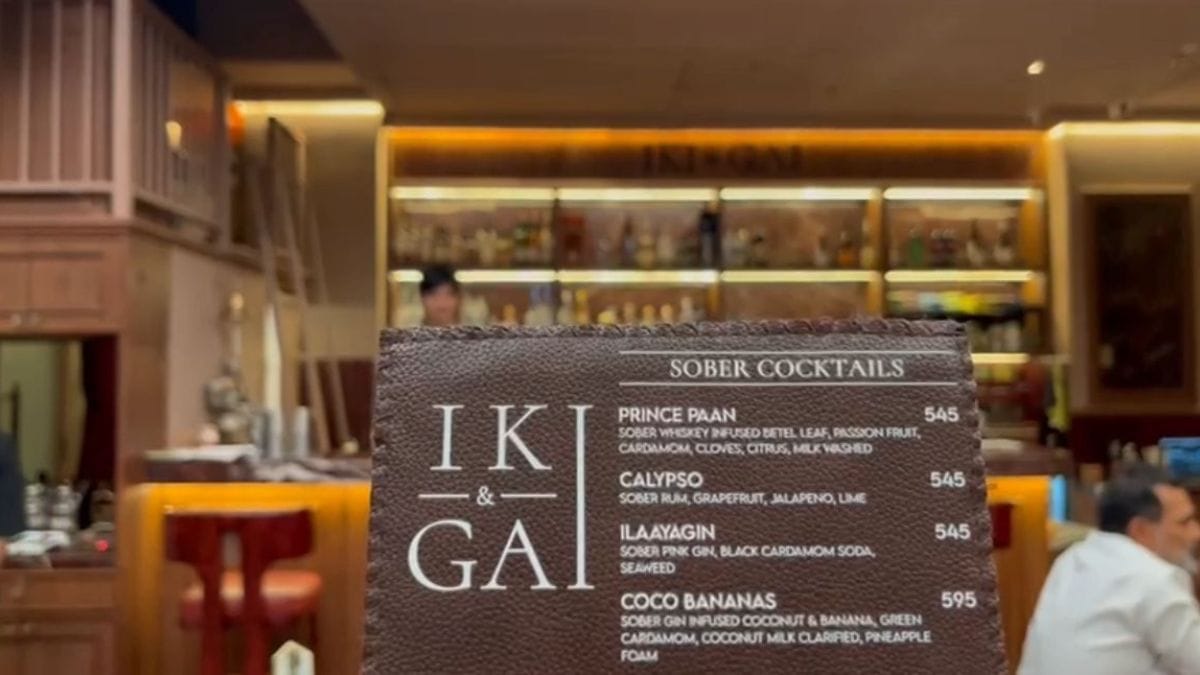
While zero-proof cocktails offer more in terms of flavour and experience, they often sit at similar price points to alcoholic drinks, that are priced between Rs 700- Rs 1,000, raising questions for customers about value for money.
And, this is precisely why one of India’s most popular beverage consultants Nitin Tewari, famous as Mr Bartender on Instagram, dismisses the possibility of the ‘sober wave’ becoming a full-blown industry in the country.
“India is a price-sensitive market where consumers are used to paying modest prices for mocktails, it’s a challenge to justify spending significantly more on a drink that doesn’t include alcohol,” he said.
Tewari noted that sustaining the culture of zero-proof cocktails is also more challenging because the competition is huge.
“Whether zero-proof cocktail sellers recognise it or not, they are competing with all the ginger ales, diet cokes, tonic waters, mocktails, fresh juices, matchas, bubble tea, literally everything,” he said. “And, all these options are available at a cheaper price. So, it isn’t tough to guess what consumers will pick for a daily basis.”
Mehta, too, agrees that she wouldn’t spend more than Rs 300-Rs 350 on a non-alcoholic drink every other day. A costly experience like a zero-proof cocktail which doesn’t have alcohol, for her, will remain a once-a-week adventure.
“Cocktails get you hooked. You go for one after the other. With zero-proof cocktails, I think it’s a one or two time thing,” she said.
Also read: ‘World is wrong about Indian street food’ — MasterChef couple Sarah Todd and Declan Cleary
Craft in zero-proof cocktails
Pranav Taneja, head mixologist at Iki & Gai Bar in RK Puram, cooks bananas with sugar and dry coconut before cooking and infusing it in the sober gin. This process is called sous vide. Then, he clarifies the liquid with coconut milk, and filters it out.
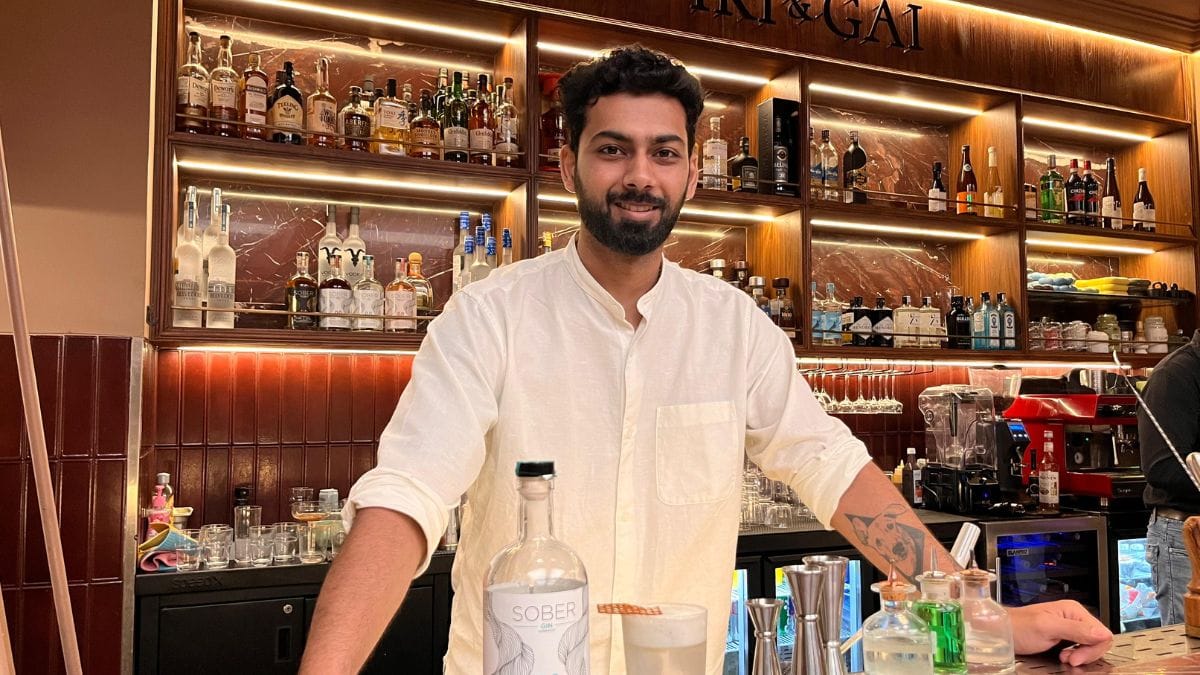
What he pours in a glass is a clear cocktail, finished off with a hot pineapple and coconut foam. It’s his top selling sober drink: Coco Bananas. This process and presentation is what makes zero-proof cocktails fancier, appealing to the eye and a replica of the alcoholic drinks.
“Customers are simply intrigued by the process. And, it pushes them to give the drink a try and then there is no going back. It’s a crowd favourite here,” Taneja said, emphasising that his sober drinks cater to non-alcoholics as well.
For years, the dramatic pours and presentations were reserved exclusively for alcoholic cocktails. Mocktails, by contrast, were typically served in simple highball or coupe glasses with a raw fruit garnish. But that’s starting to change. The absence of alcohol no longer means a lack of theatre or sophistication.
At Bo Tai, zero-proof cocktails receive the same level of presentation and storytelling as their alcoholic counterparts. Take Lady Luck, for example, a vibrant, fuchsia-hued blend of rose, strawberry, ginger, lychee, hibiscus tea, saline, and citrus, beautifully garnished with edible flowers. The bar also uses Seedlip, a plant-based non-alcoholic spirit, in standout drinks like the Rainbow Garden and Bo Tonic.
“Seedlip was among the first brands to show the world what non-alcoholic liquor could be,” said Tewari.
In Bengaluru’s SoBar, touted as India’s first sober bar, located on Convent Road in Shanthala Nagar, the menu features drinks like ‘Manisha is Complex’ made from non-alcoholic gin, clarified watermelon and jasmine tea and ‘Pickle Me Crazy’, concocted from non-alcoholic gin and pickle brine and even a guava chilli spritzer.
Burma Burma co-founder Ankit Gupta assures customers won’t miss alcohol while sipping his zero-proof menu.
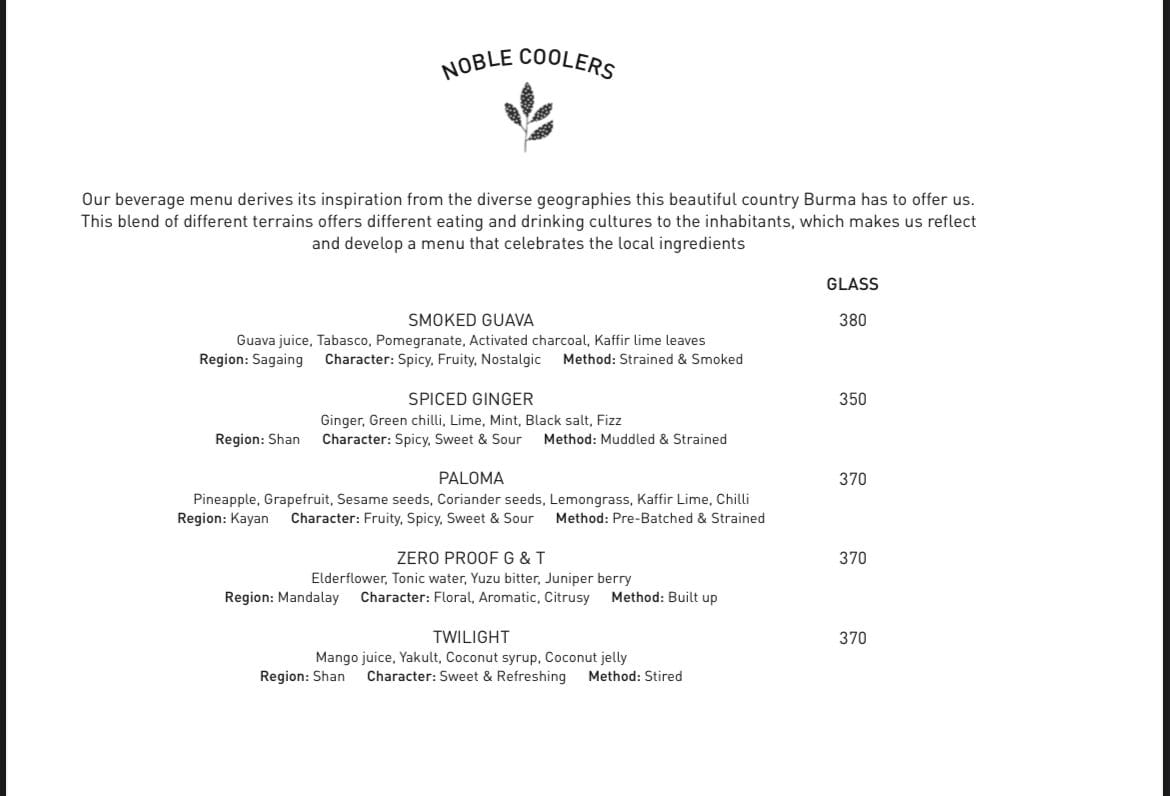
They serve a spiced Apricot iced tea, which is prepared with smoked oolong kombucha, roasted red chillies and Burmese pickled apricots. Another crowd favourite is Paloma cooler, which has pineapple and grapefruit, with an infusion of ingredients such as sesame seeds, coriander seeds, lemongrass, kaffir lime, and a dash of chillies.
“If you get a fancy presentation in a drink, which doesn’t taste like sugar water at Rs 390, it’s a happy place,” said Bisht, who picks Burma Burma for all his family dinners.
Bikash Parik, founder of Green Theory and Practically SoBar, identifies as “sober-curious”, a term that reflects a more mindful, intentional approach to alcohol consumption.
While non-alcoholic drinks currently make up only about 20 per cent of his total sales, Parik remains committed to his vision: building an inclusive community around the idea of conscious drinking. He uses his cafe’s yard to host barista takeovers with unconventional coffee cocktails and sundowners like the Sonic VHS 2.0 party to sober raves.
Practically SoBar regularly hosts two to three events each month, drawing a diverse and engaged crowd, typically between the ages of 16 and 40.
An aspirational category
India’s “sober curious” movement is no longer a fringe trend. It’s evolving into a full-fledged market. Among them is Sober, a homegrown non-alcoholic spirits brand founded by Pahuja in 2021. Alongside Shark Tank-fame labels like Catwalk Botanics, Sober is pioneering India’s foray into zero-proof liquors.
Under the brand, Pahuja has created gins, rums and whiskies flavours without alcohol.
“We don’t do the fermentation process, but the ingredients remain largely the same,” he explains. Non-alcoholic whisky, aged in casks like any other, delivers smokey, bitter notes quite like the conventional whisky, Tewari explained. On the other hand, zero-proof rum is typically made by first producing an alcoholic rum and then extracting the alcohol from it, often in a process called de-alcoholisation.
This makes it an appealing option for not only non-drinkers but also those on a temporary break, pregnant women, or the health-conscious.
Unlike sugary mocktails or watered-down alternatives, these zero-proof spirits are crafted with high-quality, low-calorie ingredients like botanicals, spices, and smoke — not syrups. But building this category isn’t easy. It’s a daily challenge.
“India hadn’t even heard of non-alcoholic spirits before,” Pahuja said.
The awareness and demand had to be created among the audience.
Despite a premium price point Rs 1,700 for Sober’s gin compared to Rs 3,100 for Bombay Sapphire, the reception has exceeded expectations. Today, Sober is stocked in nearly 100 bars across the country.
Even so, terminology remains tricky. Labels like “zero-proof whisky” “non-alcoholic gin” or “nosecco” often highlight what the drink isn’t rather than what it is.
“We use these terms for customer resonance, not to mislead,” says Pahuja. “But there’s still a long way to go in educating consumers about sobriety.”
They are also brands like Mumbai’s Sobriety Sips who sell bottled cocktails like Decaf Martini, Jungle Gin, and Smokey Picante, using botanicals, herbs, and distillation techniques.
As awareness grows, industry insiders believe that zero-proof cocktails could soon surpass mocktails in popularity. But, they will always sit in the aspirational category.
“If there is an audience which is willingly splurging money on matcha and artisanal coffee, why not on sober spirits?” asked Parik.
(Edited by Ratan Priya)



